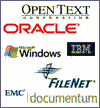
Its something of a shame that Alan Turing is not better remembered in the world of computing - as for many he really is the father of modern computing. He was quite simply a remarkable man, a mathematician, computer scientist and breaker of the Enigma code during World War II. For those unfamiliar with him I would recommend you get to know the man that was Turning better as simply grasping what he was trying to think through in the 30's & 40's is as relevant today as it was then.
Turing though is best known for the 'Turing Test', a theoretical test that would tell us if computers can actually think. (though the pedant may suggest that the original test of this kind was from Descartes in 1668!)
The test is quite simple, and in Turings own words:-
I believe that in about fifty years' time it will be possible to programme computers, with a storage capacity of about 109, to make them play the imitation game so well that an average interrogator will not have more than 70 percent chance of making the right identification after five minutes of questioning. … I believe that at the end of the century the use of words and general educated opinion will have altered so much that one will be able to speak of machines thinking without expecting to be contradicted.In fact as we review this at the beginning of the year 2006 we find out that Turing was quite frankly totally wrong. Computers are not much closer to achieving success in this test than they were 20 years ago. I find this very interesting indeed for Turing was a brilliant man, probably a genius (a much overused word these days) yet he was fundamentally wrong on this. I think the reasons he was so wrong are important for us to consider today, particularly in our world of enterprise IT.
What computers do well, is to:-
A: Compute highly complex data at incredibly high speed
B: Provide the mechanism to move data at very high speed around the World
In both these regards I think Turing would have been amazed at how much progress we have made, but fundamentally computers are no more 'intelligent' now than they were in 1950. Even the field of Artificial Intelligence is at the end of the day, complex math.
Turing himself argued far more fluently and deeply than I ever could on the various objections to his theory - of the arguements he believed against it I personally embrace the Theological Objection - 'that thinking is the function of the non-material'. But for our purposes the objection of, 'The Arguement of Consciousness'or to quote Professor Jefferson:-
No mechanism could feel (and not merely artificially signal, an easy contrivance) pleasure at its successes, grief when its valves fuse, be warmed by flattery, be made miserable by its mistakes, be charmed by sex, be angry or depressed when it cannot get what it wants.This is what we as management consultants and analysts in the technology World neglect to our cost. Good work comes from motivated and passionate workers, if technology can support them in their task then it is good technology. But however we look at it a business is nothing more than its workers, be they managers, executives or more junior staff. If they have a shared vision and are motivated to succeed then they likely will, if they are not then no amount of technology will help.
When we consider KM, Workflow, Inforamtion Management etc we are looking at technologies that directly impact the working life of people and this technology has severe limitations. It will never be (I believe) intelligent in it's own right, and will always be there to support the work of people.
We need to consider too the implications of outsourcing processes and tasks in the same light, if we over estimate the value and abilities of technology in the process of considering outsourcing then we will be left unsatisfied with the result.
Turing and his work merits a great deal of thought, discussion and arguement and my thoughts are at best light and frivolous, but I hope that introducing his work, and suggesting it worthy of consideration regarding the limits of computing worthwhile.
For more information on Turning and his work check out:-
Alan Turning Homepage













